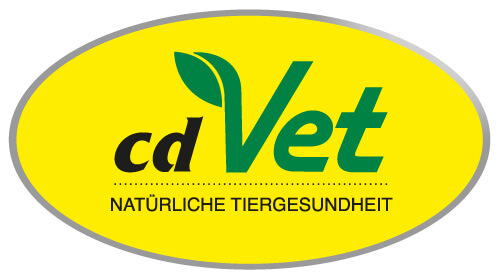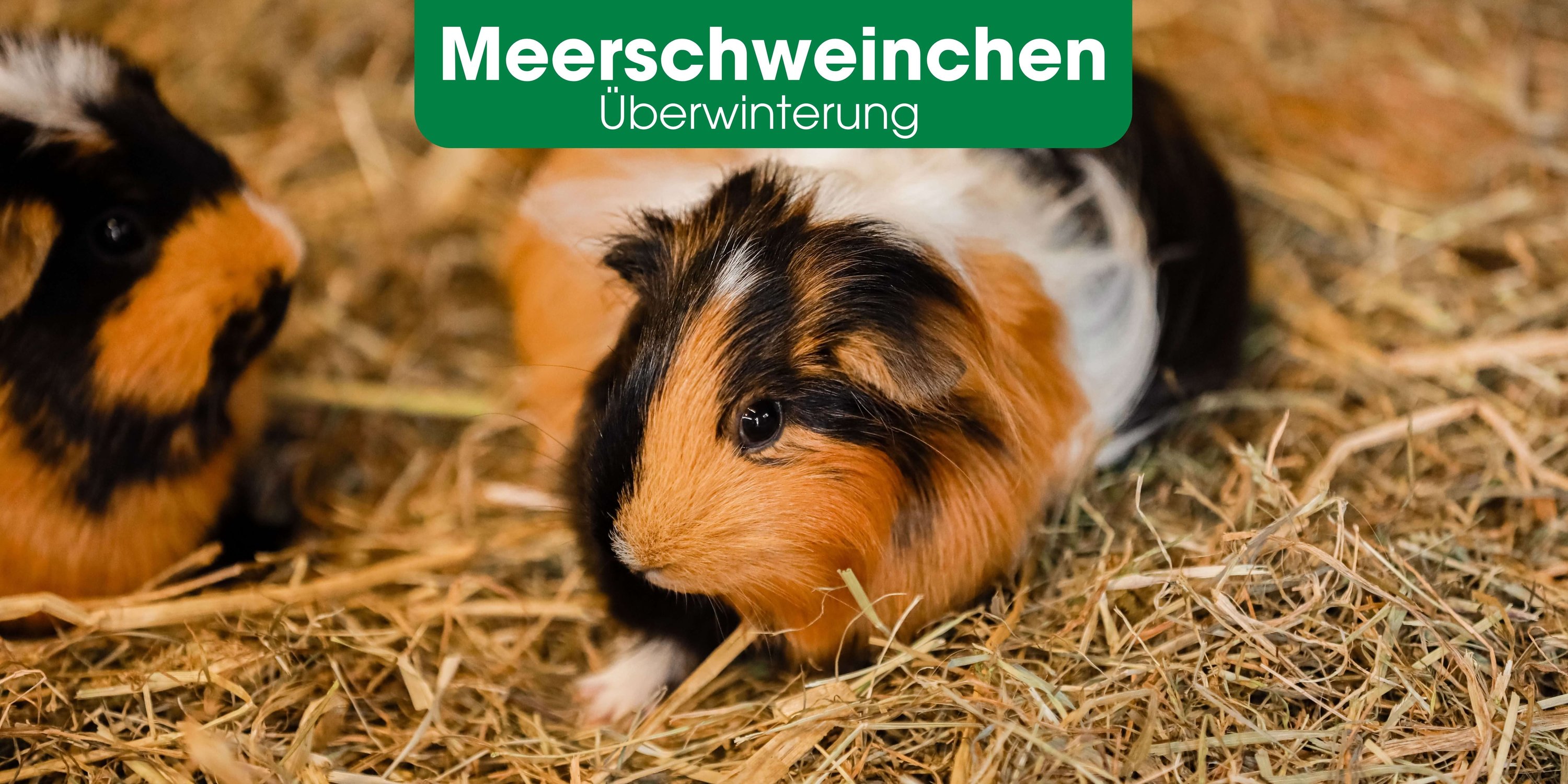
Where do guinea pigs hibernate?
Deciding whether to hibernate your beloved guinea pigs outdoors or indoors in a warm house is an important consideration for any pet owner. Both options have pros and cons that should be carefully considered to make the best choice for the animals' health and well-being.
Outdoor housing
Pros
- Natural environment: Guinea pigs are naturally outdoor animals. Outdoor housing provides them with a more natural environment.
- Exercise: outdoors they have more space to run around and explore.
- Fresh air and sunlight: outdoor animals get fresh air and sunlight, which is important for their health.
Cons
- Cold: in winter you need to make sure your guinea pigs are protected from the cold. This may require the use of insulated hutches or heated shelters.
- Predator protection: outdoors guinea pigs are vulnerable to predators. You need to make sure the outdoor area is safe to keep your animals out of harm's way.
- Maintenance: keeping them outside requires more effort in terms of cleaning and maintaining the enclosures.
Keeping them inside
Pro
- Temperature control: inside you can better control the temperature and ensure that your guinea pigs are warm enough. You should offer temperatures between 18°C and 22°C.
- Protection from extremes: inside your animals are protected from extreme weather conditions such as cold, heat and storms.
- Safety: keeping them inside protects your guinea pigs from predators such as birds of prey or cats.
- Social interaction: you can more easily maintain social interaction with your guinea pigs when they are indoors.
Cons
- Space requirements: you need enough space in the house to set up a species-appropriate habitat.
- Cleaning: keeping them inside requires regular cleaning as odor and droppings can accumulate. Increased susceptibility to respiratory infections due to dry heating air.
Conclusion
The decision depends on individual circumstances and preferences. If there is enough space and resources, guinea pigs can be kept indoors, providing them with a safe and cozy environment. Hibernating outside is more natural, but requires more effort to protect them from the elements and predators. It is important to ensure that, regardless of choice, guinea pigs have a species-appropriate home and are adequately protected from weather conditions.
The right diet
Guinea pigs' diets should be based primarily on hay and can be effectively optimized by adding dried herbs such as "TinyHerbs Fitness" and "TinyHerbs Fruit" in addition to seasonal fresh vegetables such as fennel, carrots and iceberg lettuce.
Grain feeds that are rich in starch do not meet the nutritional needs of these animals. If guinea pigs are fed a one-sided diet of grains and lack sufficient hay, this can lead to inadequate food intake, where the chewing process is also not sufficiently intense. This chewing process is crucial for the physiological wear of the teeth and should not be done primarily by gnawing on "substitute objects". A diet without sufficient hay can lead to imbalances in the calcium-phosphate ratio and, as a result, excessively long teeth.
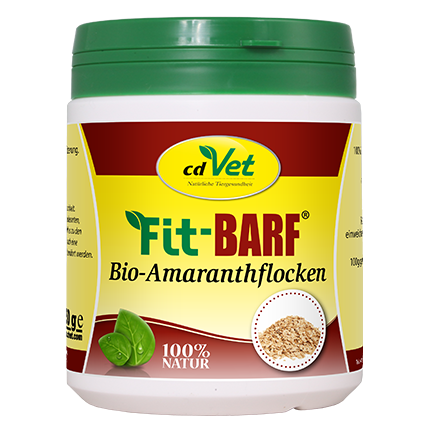
Feed material for dogsTo supplement the daily ration at raw feeding.Amaranth is one of the oldest agricultural crops of humankind.It is not among the sweet grasses, such as normal grain varieties.It is one of the fox tail plants.This makes it to one of the pseudo-cereals.Amaranth is gluten-free and thus an excellent alternative for dogs who are fed grain free.- easily digestible- As an addition to fresh or canned meatComposition: 100% Bio- Amaranth flakes inspection DE-ÖKO-001 EU AgricultureAnalytical constituents: Crude protein 13.5%, crude fiber 2.5%Feeding recommendation: Pour the Fit-Barf Bio- Amaranth flakes with hot water, let it swell for at least 15 minutes and then feed with fresh or canned meat.Up to 10% of the total amount of feed as soaked flake.For soaking, the ratio 1 part flakes and at least 2 parts water is recommended.From 10g dry flake about 30g ready to eat flake.
Content: 0.4 Kilogramm (€27.38 / 1 Kilogramm)
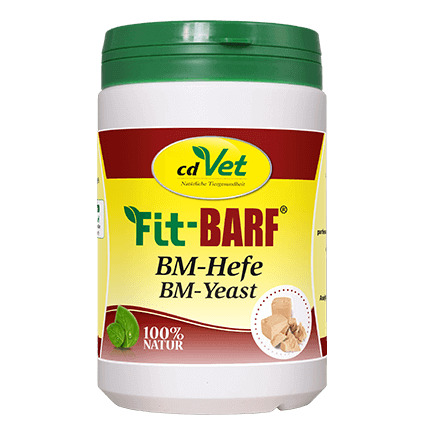
Complementary feed for dogs and cats.For the appropriate supply at raw feedingBM-yeast (brewer´s yeast bounded on malt rootlets) Brewer´s yeast contains biotin, folic acids, ferrous, zinc and trace elements which has a positive influence on the condition and resistence of skin and hair. Also the ability for regeneration of the single cells can be affected diet-related. Malt rootlets distinguish themselves by her content of slightly digestible carbohydrates, crude fiber and crude protein. Through their high content of crude fiber the seedling have a good dietary value.Composition: Malt rootlets, brewer´s yeast.Analytical constituents : Crude protein 30,0%, crude fat 2,0%, crude fiber 9,0%, crude ash 7,0%.Feeding recommendation: Daily cats/small dogs 1 measuring spoon, medium dogs 2 measuring spoons, large dogs 3 measuring spoons. 1 measuring spoon corresponds to about approx. 1,2g.
Content: 0.6 Kilogramm (€18.25 / 1 Kilogramm)
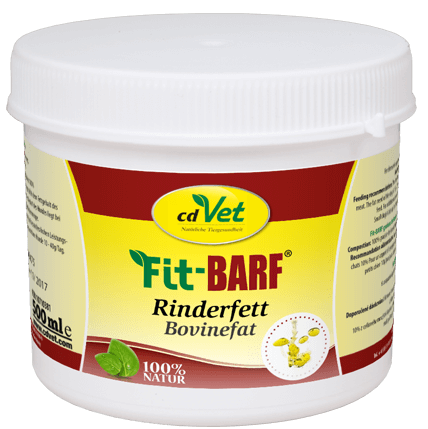
Feed material for dogs and catsFor the appropriate supply at raw feedingThe proportion of animal fat should be 15-25% in the diet of the dog and the cat should be at about 10%. If your dog or cat is fed with lean meat, it uses proteins to produce energy. In this case, wastes will be generated that need to be digested by liver and kidneys. The strain on the metabolism increases. On the long term, this can lead to congestions of the excretory organs. In case of dogs or cats that are poorly using the feed or very underweight, special attention should be paid to the fat content of the meat.Composition: 100% pure bovine fat.Analytical constituents: 100% crude fat.Feeding recommendation: cats 2-5 g, small dogs approx. 10 g, medium-sized dogs approx. 10-40 g, large dogs approx. 40-80 g.Depending on activity and energy needs feeding can be adjusted.If fat is being fed for the first time, please note that the addition must be slowly increased to the desired amount. The cat or dog should be given enough time for this change and should be particularly monitored during this time. Only then you can decide, whether your pet can cope with the amount of fat being fed. It is important to consider each animal as an individual.
Content: 0.5 Liter (€29.90 / 1 Liter)
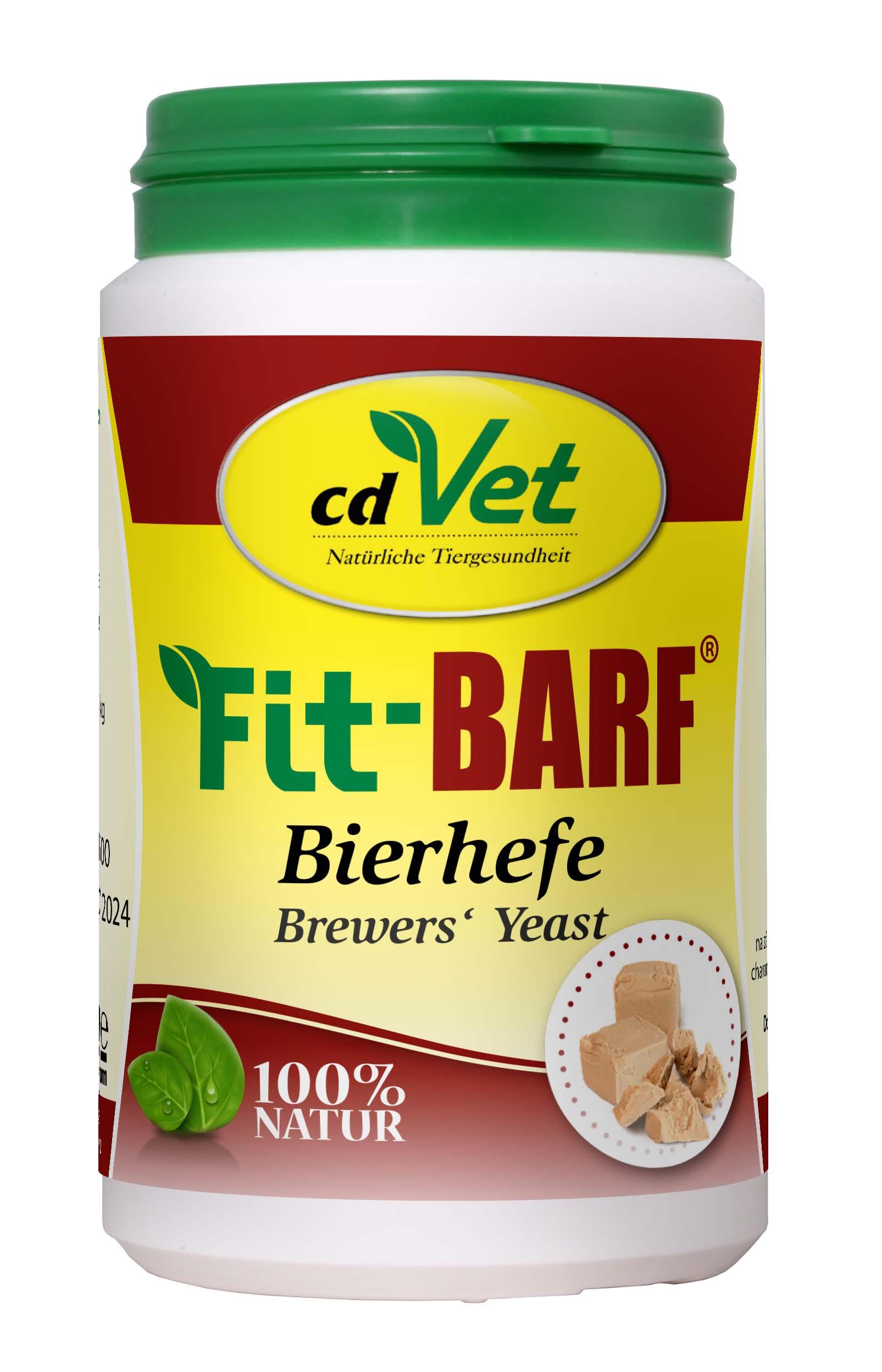
Feed material for dogs and catsFor the demand-oriented supply in raw feeding, powderBrewers‘ yeast, as the most balanced, natural source of vitamin B, whose vitamins are present in a broken down state and can be absorbed directly, is a valuable addition to the daily diet. In addition, brewers‘ yeast has a positive effect on the intestinal flora. Its content of phosphorus, potassium, magnesium, calcium, iron, zinc, copper, and manganese, as well as the trace elements cobalt, molybdenum, chromium, and selenium, provide an important contribution to demand-oriented nutrition.Composition: 100% brewers‘ yeast (Saccharomyces cerevisiae)Analytical constituents: crude protein 46%, moisture 6%Feeding recommendation: 1 g/10 kg body weight daily. 1 half tsp. corresponds to approx. ca. 1.5 g.
Content: 0.2 Kilogramm (€54.75 / 1 Kilogramm)
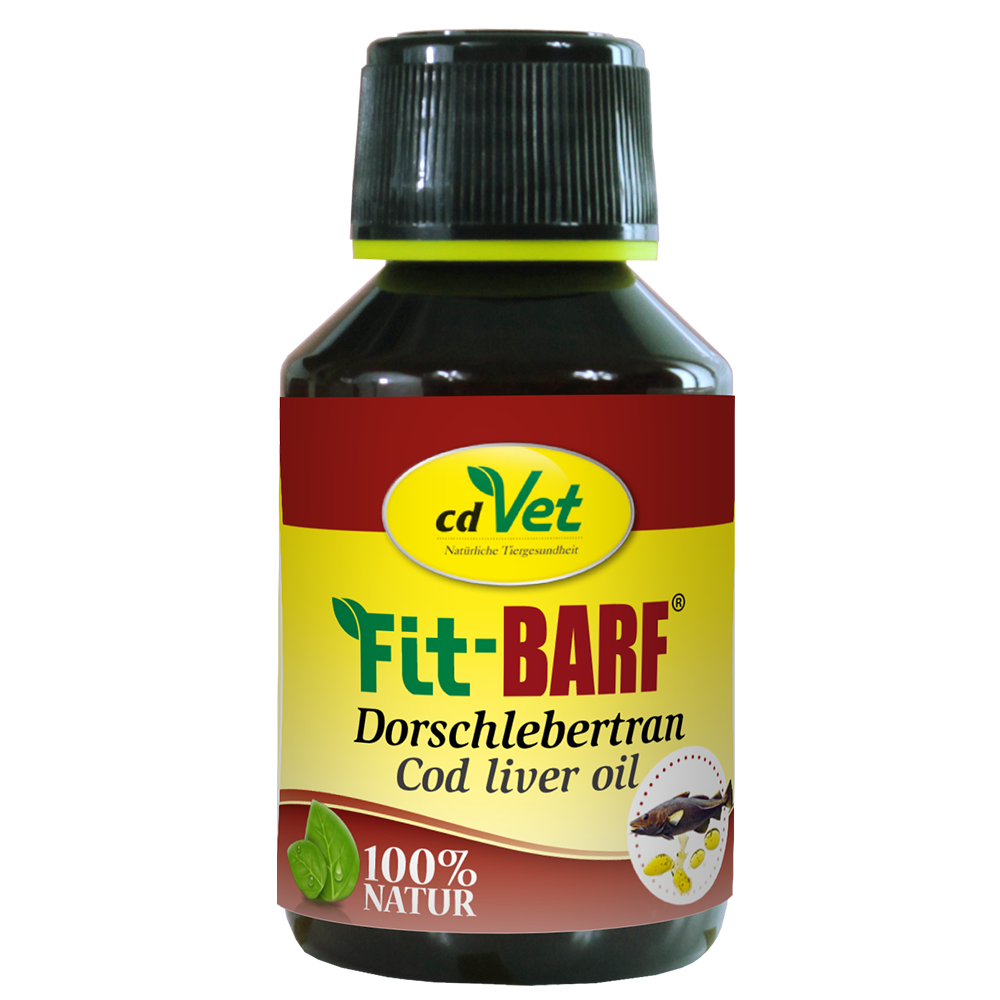
Feed material for dogs and catsNatural source of omega-3 fatty acids and vitamin DFit-BARF Cod Liver Oil is a high-value supplier for omega-3-fatty acids and vitamin D. Omega-3-fatty acid (for example linolenic acid) are polyunsaturated fatty acids, which cannot be created itselves by the body. Thus they are called essential and must be fed to the organism with the nutrition. Vitamin D is important for the builing of the bones and the regulation of the calcium balance.Composition: 100% Cod liver oil.Feeding recommendation: 1-2 x per week. Small dogs, cats: 0,5 tsp. Midsize dogs: 1 tsp. Large dogs: 1.5 tsp. For daily feeding, we recommend a period of 4-6 weeks.After opening store in cool and dark place and use it within 6 weeks!
Content: 0.1 Liter (€109.50 / 1 Liter)
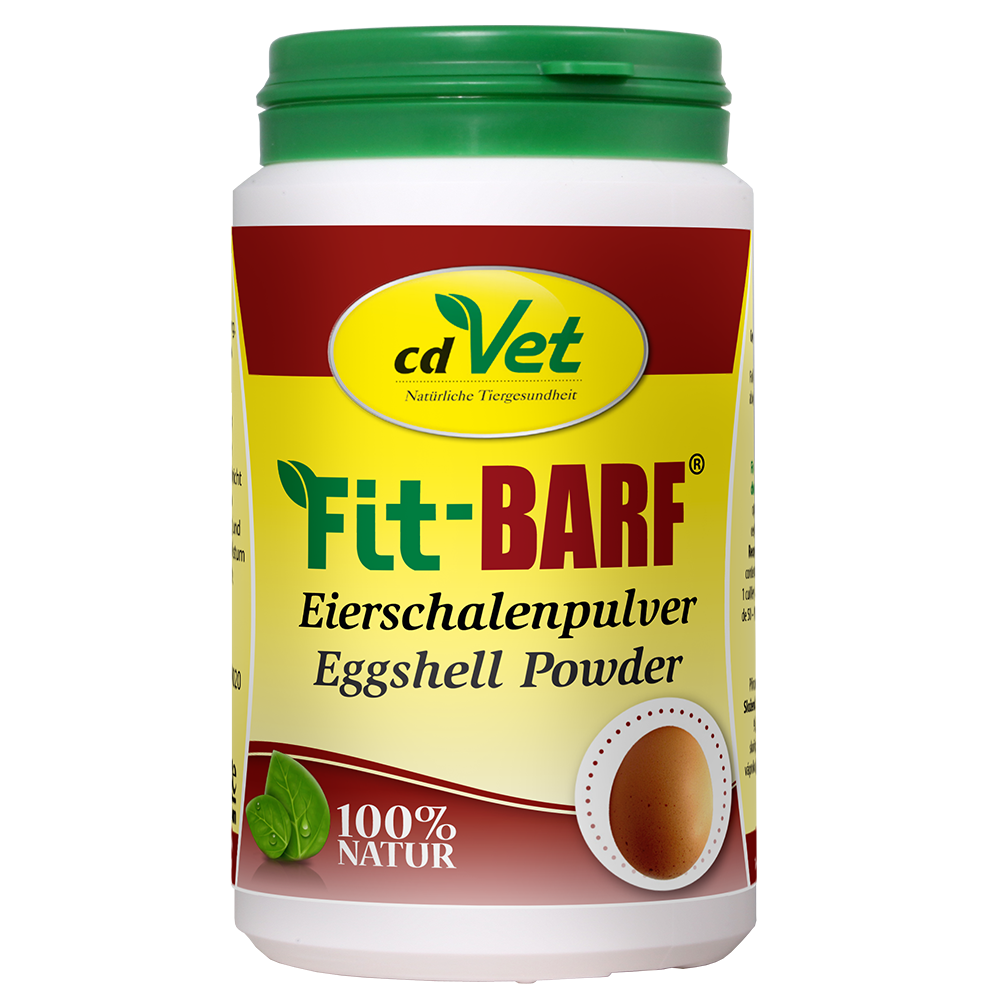
Feed material for dogs and catsNatural source of calcium for the demand-oriented supply when feeding raw meat, powderCalcium intake, in particular, plays a major role in the feeding of raw meat. This can only be achieved by feeding sufficient bone. Not every dog can or wants to eat bones, and in the case of cats, feeding whole prey (mice or chicks) is not always problem-free either.Fit-BARF Eggshell Powder is a readily utilizable animal source of calcium for daily feeding. It provides balance when feeding raw meat by balancing the high phosphorus content of the meat with its natural calcium content. Due to the fine degree of grinding, the product has a high bioavailability.neutralization of phosphorus excess with predominant meat feedingfor bone-free feedingas an extra source of calcium in times of increased demand (growth, gestation, lactation)Expert tip: For a safe supply of all important micronutrients, such as minerals, trace elements, and vitamins, we recommend feeding Fit-BARF Mineral.Composition: eggshell powder 100%Analytical constituents: crude ash 95.9%, calcium 37.1%Feeding recommendation: Mix daily into the feed. Dogs: 1.5 g/10 kg body weight. Cats: 0.75 g/5 kg body weight. 1 quarter tsp. corresponds to approx. 1.5.1 g eggshell powder contains approx. 370 mg calcium. The daily requirement of calcium is about 50-90 mg Ca/kg body weight. Gestating and lactating bitches as well as growing puppies need up to 180 mg Ca/kg body weight. If you also feed bones, we recommend reducing the amount.
Content: 0.3 Kilogramm (€36.50 / 1 Kilogramm)
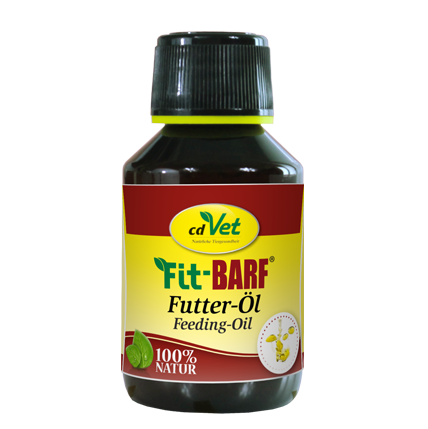
Complementary feed for dogs and catsFit-Barf Feeding Oil is a purely natural basic oil and is generally intended as optimal energy carrier.Fit-BARF Feeding Oil is a mixture of high-grated cold-pressed vegetable oils. Cold-pressed, food-grade linseed oil forms the basis of this purely natural feeding oil. This admixed functional oils (evening primrose oil, wheat germ oil, pumpkin seed oil and argan oil) ensures the optimal, well-balanced maintenance with essential fatty acids. Through this combination of pure naturally ingredients Fit-BARF Feeding Oil is a high-concentrated energy source and similarly an origin of significant vital substances of selected oils in one product.Composition:Linseed oil, evening primrose oil, wheat germ oil, pumpkin seed oil, argan oil.Analytical constituents: Crude protein 0.1%, crude fat 99.6%, crude fiber 0.1%, crude ash 0.2.Feeding recommendation: Daily small dogs and cats 0.5 teaspoon, medium dogs 1 teaspoon, large dogs 1.5 teaspoons.After opening, keep cool and dark and use within 6 weeks!
Content: 0.1 Liter (€129.50 / 1 Liter)
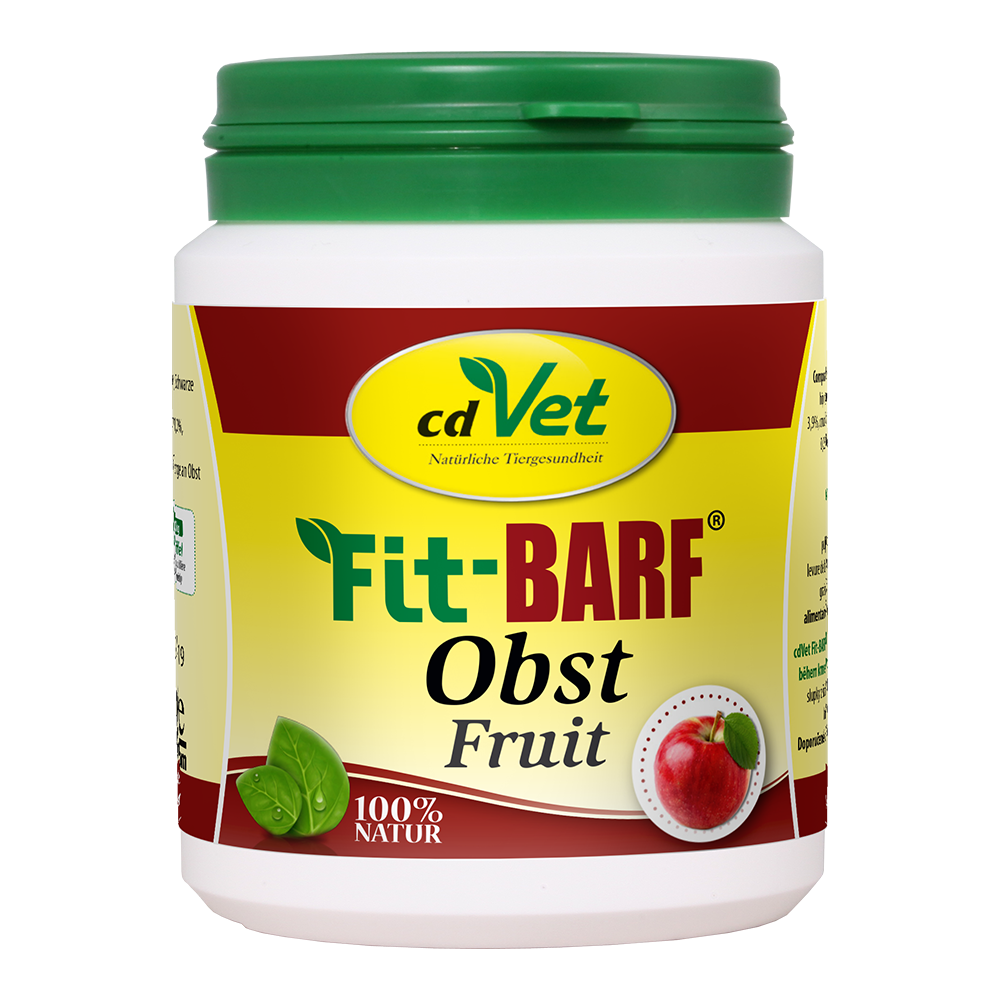
Complementary feed for dogs and catsFor supplementation of the daily ration with fruit, powderFit-BARF Fruit is made from selected ingredients to enable a well-balanced nourishment with feeding. It complements the requirement of vitamins (Niacin, Riboflavine (B2), folic acids, E, A, K, C), flavonoids (polyphenols) as well as fiber.Fit-BARF Fruit is free of grain and a healthy alternative to vegetables. It does not bring only variety, but also a balance in the BARF feeding plan. In combination with Fit-BARF MicroMineral, the basis is thus laid for healthy raw feeding.Composition: aronia pomace, apple pomace 20.5%, strawberry pomace, black currant pomace, rose hip husks, malt rootlets, brewers‘ yeastAnalytical constituents and levels: crude ash 3.4%, crude protein 11.0%, crude fat 6.1%, crude fiber 25.9%, calcium 0.33%, phosphorus 0.26%Feeding recommendation: Give 4 g/10 kg body weight 1-2 x a week onto the feed. 1 tsp. corresponds to approx. 2.4 g.
Content: 0.1 Kilogramm (€109.50 / 1 Kilogramm)
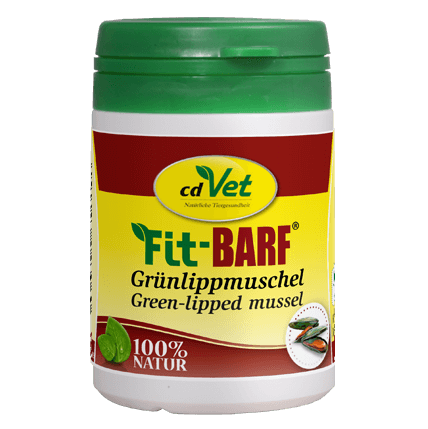
Feed material for dogs and catsNatural source for taurine and glycosaminoglycans - for the demand-oriented provision at feeding with raw meat, powderThe naturally very high taurine content of the greenshell mussel is a very pleasing aspect for cat owners. Cats in particular depend on a sufficient supply of this organic acid in their food, as they cannot produce taurine themselves and lose a large part of it through their excretions. Taurine is essential for cats. A deficiency can lead to severe impairments and physical damage.Fit-BARF Greenshell Mussel consists of New Zealand greenshell mussel powder (Perna canaliculus, freeze-dried, non-defatted mussel meat). In addition, the greenshell mussel provides important components of the body‘s own mucous membrane as a building block and can thus have a supportive effect on the functionality and elasticity of the urinary bladder and all other mucous membranes. Occasionally fed, the trace elements and vitamins contained in the greenshell mussel can have a positive effect on vitality, metabolism, nutritional imbalances and on stressed skin.Expert tip: Does your dog suffer from joint problems? Then take a look at ArthroGreen Classic. The herbal composition, proven for years, supports your beloved four-legged friend on his daily tours.Growing puppy? Here ArthroGreen Junior offers the nutrients for a safe step into the big, wide world.Composition: New Zealand greenshell mussel powder (Perna canaliculus, freeze-dried, non-defatted mussel meat) 100%Analytical constituents: crude protein 54,1%, crude fat 10,3%Feeding recommendation: Add daily to the feed. Cats: 0.5 g/5 kg body weight. Dogs: 0.5 g/10 kg body weight. 1 half tsp. corresponds to ca. 1.5 g.
Content: 0.035 Kilogramm (€455.71 / 1 Kilogramm)
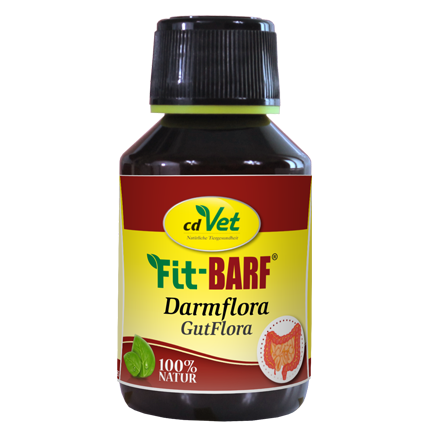
Complementary feed (liquid, fermented) for dogs and catsSupport of intestinal condition, especially in case of nutritionally disturbed intestinal flora and digestive problemsBillions of tiny microorganisms are found in the intestine. A distinction is made between pathogenic bacteria (pathogens that cause disease) and bacteria that are beneficial for healthy intestinal flora, such as lactic acid bacteria. These ‘good‘ bacteria are hard-working helpers of the immune system and have a positive influence on digestive juices, enzymes, and the intestinal mucosa. The pathogens are properly fought and displaced. In addition, an intact intestinal flora ensures a good digestion.If the natural intestinal flora is disturbed, excessive colonization by pathogens can occur and the dog gets diarrhea. Antibiotic treatments can also attack the protective function - often the drugs do not distinguish between ‘good‘ and ‘bad‘ bacteria. The intestinal flora is disturbed, its defense mechanism functions only to a limited extent and the intestinal wall is adversely affected.The ancestor of our dog - the wolf - therefore also eats the digestive organs of its prey. They contain all the necessary microorganisms for a well-functioning intestinal flora. It is not always possible to feed fresh rumen or omasum. Even frozen they do not compensate for the lack of valuable bacteria and enzymes, as these are destroyed by freezing. This deficiency can be compensated very well with fermented herbs. Therefore, regular feeding with Fit-BARF GutFlora is recommended, even with nutritionally disturbed intestinal flora as well as digestive problems.Displacement of pathogenic bacteriaStimulation of the immune systemImproved digestion of foodMaintenance of intestinal peristalsisComposition: stinging nettle, echinacea, hibiscus, oregano, peppermint, stevia, fenugreek seed, ribwort plantain leaves, licorice root, yarrow herb, wormwood herb, marshmallow roots, thyme, Chinese rhubarb root, anise, fennel, raspberry leaves, cowslip roots, aronia berries pomace, spiny restharrow roots, rosemary leaves, sunflower blossoms, rock salt, sugar cane molassesAnalytical constituents: crude protein 0.2%, crude fiber 0.2%, crude fat 0%, crude ash 0%, moisture 98.3%, sodium 0.03%Feeding recommendation: Add 1.5-2 ml/5 kg body weight to the feed 1 x daily for at least 4-6 weeks. Thereafter, regular feeding is recommended 1-2 x a week or as required.Store it cool and dark, protect from frost!
Content: 0.1 Liter (€109.50 / 1 Liter)
